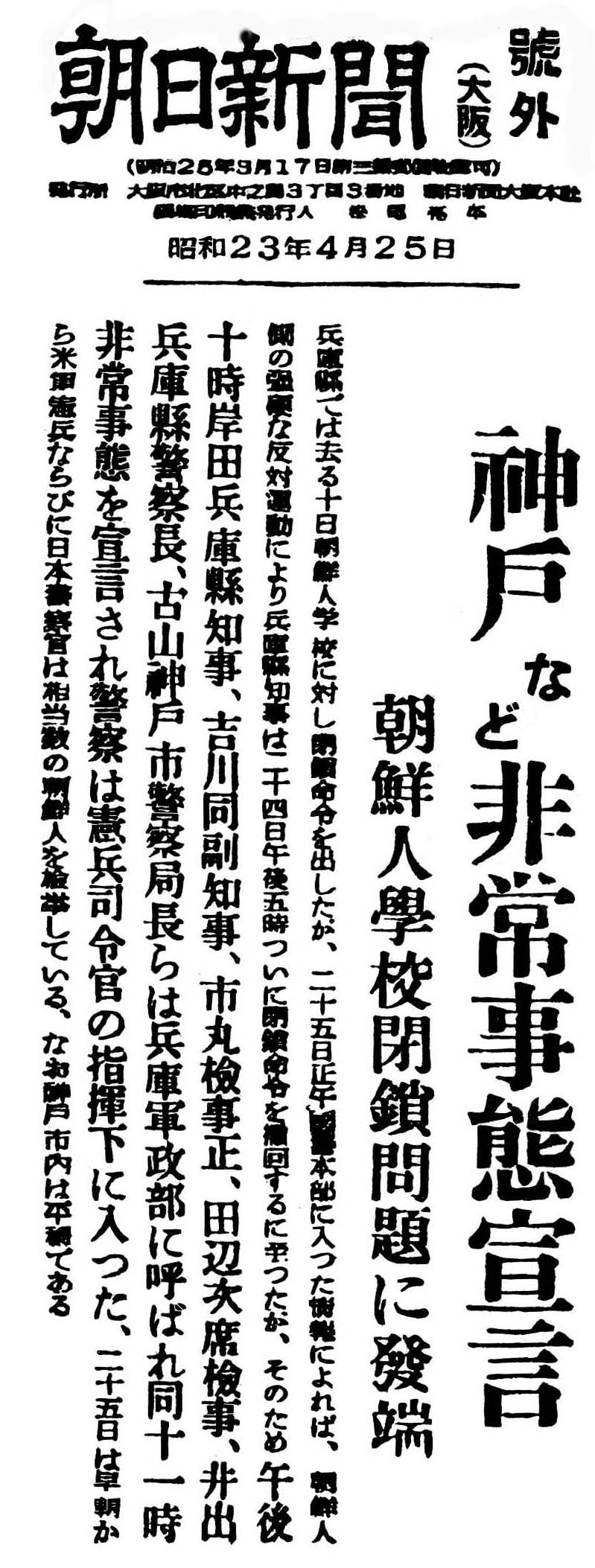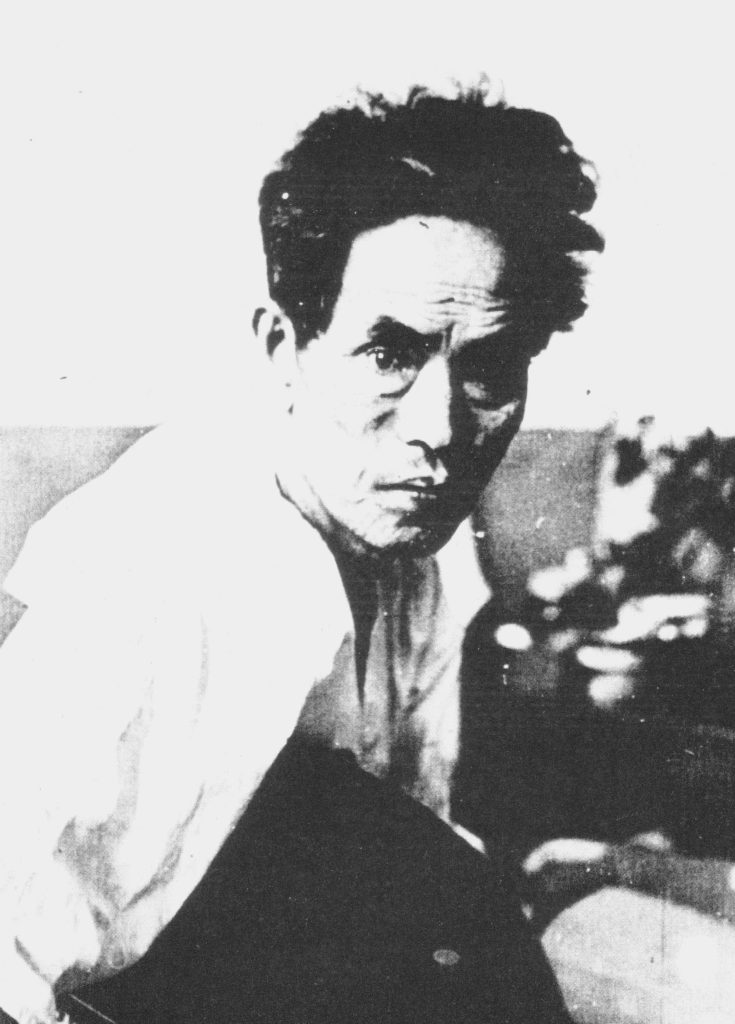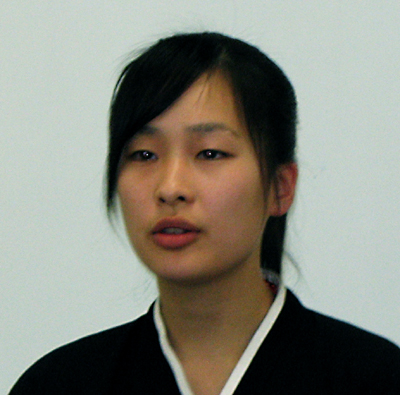キリスト教と在日コリアン

獄やにあって愁いは多く 夢はなお果たせない
晴れわたった空の月が 刑務所の建物を照らしている
故里の村に雲の湧き
高い木の梢に 鳥が啼いて 日の傾くのを想う
いまはむしろ死すとも 富貴をむさぼるときでない
自分は獄中の身だが 憤りの声は世にあふれている
教育闘争の四・二四
年々歳々 その心は忘れられることがない
(朴 柱範 1948年11月30日 )
敗戦後,70余年前の神戸で行なわれた「神戸事件」について語られることはほとんとどありません。忘れられています。「阪神教育事件」,「阪神教育闘争」,「4・24(サイサ)教育闘争」とも呼ばれます。米軍占領下で一度だけ非常事態が神戸で宣言されたことがあるのです。1948[昭和23]年1月24日,文部省学校局長は各都道府県知事に対して,「朝鮮人設立学校の取扱いについて」という通達を勧告。同年4月10日,兵庫県岸田幸雄県知事は朝鮮人学校に対して,閉鎖するように命じました。全国各地で民族学校を死守するために在日コリアンは立ち上がりましたが,神戸と大阪の抵抗は最も熾烈を極めましたから,「阪神教育闘争」と言います。やっと自分たちの民族の言葉で勉強できる学校を期待していた在日朝鮮人たちはがっかりしました。抗議のため,全国から日本人を含めて[主に日本共産党員],神戸市湊川公園に4万5千人が集まりました。4月24日午後23時,戒厳令が出されました。知事や市長などの権威を無視して,アメリカ軍は軍隊を発動し,日本の警察動員にも介入し,非常事態宣言を行なう戒厳令があったことを歴史で教えるべきでしょう。
朝日新聞号外 1948年4月25日付け
地元の人たちの外出は禁止されたのです。25日から29日までに,兵庫県内だけで1590人[全国では7295人]が検挙されました。日本人9人と在日朝鮮人8人が,重労働4年以下の判決を受ました。この数字からも戦後すぐの日本共産党の活動の中核をなしているのは在日朝鮮人たちであったことがわかります。在日朝鮮人に対して,最高重労働15年の判決も出されたのです。刑期終了後は本国に強制送還されることになりました。在日本朝鮮人連盟県本部委員長を務め,尊敬されていた64歳の朴柱範[パク・チュボム 1885-1949]さんも病身のまま,神戸刑務所に投獄されました。1949年11月,拷問と老体のために仮釈放の4時間後に他界しました。大阪では,学校閉鎖の反対のデモに加わった金太一(キム・テイル)少年(16歳)が大手前公園で1948年4月26日午後3時40分に警察によって射殺されたりしました。
3月31日 岸田幸雄兵庫県知事と小寺謙吉神戸市長は朝連が運営している灘初等学院,東神戸初等学院,西神戸初等学院と建国青年同盟が運営している4校に立ち退きを命令。
4月10日 県知事は,朝鮮人学校に対して,封鎖命令を出した。
4月14日 朝連は,兵庫県庁を訪れ,知事との交渉を要求。
4月23日 警官隊とMPは,朝鮮人学校灘校と東神戸校を封鎖。
4月24日 封鎖に抗議する在日朝鮮人や日本人が,兵庫県県庁前に集結。9時30分 兵庫県庁知事室で,岸田知事,小寺謙吉神戸市市長と検事正ら15人は朝鮮人学校閉鎖仮処分執行問題と,在日朝鮮人の抗議集会対策を協議。朝連は兵庫県知事室での密談の情報を入手し,約100人の在日朝鮮人や日本人が兵庫県庁内に突入。知事応接室を占拠して備品などを破壊した後,壁を打ち破って知事室になだれ込み,岸田幸雄やMPを監禁。在日朝鮮人や日本人約100人は電話線を切断して外部との連絡を絶ち,「学校閉鎖令の撤回」「朝鮮人学校閉鎖仮処分の取り消し」「朝鮮人学校存続の承認」「逮捕された朝鮮人の釈放」などを知事に要求。
17時 知事は「学校閉鎖令の撤回」「朝鮮人学校閉鎖仮処分の取り消し」「朝鮮人学校存続の承認」「逮捕された朝鮮人の釈放」を誓約。
22時 岸田知事,吉川副知事,市丸検事正,田辺次席検事,出井兵庫県警察長,古山神戸市警察局長らはアメリカ占領軍兵庫県軍政部に招集。
23時 兵庫県軍政部は「非常事態宣言」を発令。日本の全警察官はアメリカ軍憲兵司令官の指揮下に入った。兵庫県庁への乱入者の徹底検挙が命じられ,知事が誓約した「学校閉鎖令の撤回」「朝鮮人学校閉鎖仮処分の取り消し」「朝鮮人学校存続の承認」「逮捕された朝鮮人の釈放」などはすべて無効とした。
4月25日早朝 アメリカ軍憲兵と日本警察官は兵庫県庁への乱入者を検挙し始めた。
朴さんは1927年来日し,神戸市東灘区に住んでいました。30年代はじめには関西学院神学部出身の金英哲牧師とともにキリスト者として働いています。賀川豊彦から始まった阪神消費組合の設立にも参与され,後に理事に就任しています。村会議員を2期務めています。1948年に,自分たち民族の言葉で教育することを許可して欲しいと立ち上がりました。当時,朝鮮半島はまだ北と南に分かれていない時期でした。
[大韓民国(48.8.15)/朝鮮民主主義人民共和国(48.9.9)成立]。
「神戸事件」の責任を問われた朴さんの墓は日本のどこを探してもありません。しかし,朴さんの命がけのねばり強い嘆願によって,同年5月,朝鮮人団体と文部省が「朝鮮学校は私立学校として認可する」などと調印しました。朴さんは自分の死と引き換えに,朝鮮学校はなくならず,今でも残っています。朴さんは,在日同胞が差別,偏見,抑圧により,うめき苦しんでいるのを見て,モーセのように立ち上がりました。来日した朝鮮人にまず言葉を教えました。身寄りがない朝鮮人のために身元保証人に喜んでなりました。裁判事件になったりすると,釈放のため自ら保証人を引き受けたりしました。在日朝鮮人の間では指導者として信望が篤かったのです。
50年を経た1998年に次女朴再禮さんが神戸に招かれました。その際,「こんなかたちで亡き父を追悼していただき,本当にありがとうございます」と語ったのです。
ただし,アメリカ連合軍は,朝鮮民族学校に義務教育を適用しませんでした。自動車学校などと同じように各種学校扱いのままで今日に至っています。
現在,200万人以上の外国人が日本に住んでいます。毎年1万人以上の外国人が日本の国籍をとっています。国際結婚も増えています。国籍が二つある子どもも珍しくなくなっています。しかし,日本は「多民族・多国籍」の人たちが住むのにふさわしいとは言えません。学校でのいじめや,友だちができないなどの理由で就学していない子どもの割合は約7%にもなっています。日本には朝鮮学校,中華学校などは100校ほどあります。ところが,海外諸国とちがって,日本だけがいまだに外国人という理由で助成金を出しません。ですから通学定期券がとれないとか,授業料の消費税などの不自由が多くあります。チマチョゴリを着ているだけで,通学の時に日本の学生たちから,「朝鮮人なんて皆死ねばいい」「チョゴリを着たやつは殺す」と謂われない侮辱を今でも受けたりします。差別がなかなかなくなっていません。(2008年司法書士人権フォーラム作文最優秀賞)。
http://www1.korea-np.co.jp/sinboj/j-2008/03/0803j1215-00002.htm
多民族・多文化の問題を真剣に考え,共生することができるようになった国にカナダがあります。カナダから小中学校の教師が神戸に来て,人権について日本の教師たちと交流します。多民族・多文化共生はできるのでしょうか。2009年4月20日~25日の神戸滞在中,小学校,中学校などを精力的に訪問。4月24日の神戸事件[阪神教育事件]を記念する日に,神戸バイブル・ハウスでシンポジウムが開かれます。「主権国家」,「固有の領土」(英語にできない)などを主張すればするほど問題が山積する中で,多民族・多文化共生が日本でもどのように定着するかをご一緒に考えてみましょう。
http://www1.korea-np.co.jp/sinboj/j-2009/03/0903j0513-00001.htm

朴柱範(발제강연 Joo-Bum Park)氏略歴
Chairman Pastor Yoshio Iwamura
| List of issues in connection with the 5th periodical report from Japan |
|
Rights of persons belonging to minorities (arts. 24 and 27) Please provide detailed information on measures taken to ensure adequate opportunities for minority children to receive instruction in or of their language and about their culture, in particular as regards the Korean and Ainu minorities (paras. 378-383 of the report). What measures have been taken towards officially recognizing Korean and other minority schools, making available subsidies to such schools on a non-discriminatory basis, and recognizing their school leaving certificates as university entrance qualifications? |
In March of this year, the Japan Federation of Bar Associations (JFBA) demanded adjustments of the ‘wide gap’ in subsidies between ordinary schools for Japanese students and ethnic schools such as Korean schools once again following recommendation submitted 10 years ago. Moreover, it is the fact that Korean schools are obliged to rely heavily on donation because of a subsidy gap. Although reduction and exemption of tax for donors are adopted as far as Japanese private schools or international schools are concerned, there is no preferential treatment to individuals or corporations who donates to Korean schools. The JFBA required the Government of Japan (GOJ) correcting discriminatory measures, as they are obviously ‘regarded as discriminatory treatments’.
In addition, while the GOJ recognizes the eligibility of other foreign schools to apply for admission to universities in Japan, it does not recognize qualifications of those who graduated from Korean schools, and they are individually judged by each university’s decision. The JFBA required correcting such a discriminatory system.
And the JFBA ‘recommended to take proper measures immediately’ to the GOJ saying that such kind of discrimination is a ‘violation of the Right to Lean of those who go or want to go’ Korean schools.
In addition, with regard to the instruction of Vice Minister of Education (1965) which said that ‘Korean schools whose objectives are to cultivate their ethnicity or nationality cannot be recognized to have positive meanings for our society of our country’, the JFBA recommended a decade ago saying that ‘the GOJ should take proper measures to eliminate the violation of human rights and restore damages by withdrawing this instruction’. Although this problem was brought up for discussion of the reports on the GOJ in the previous Human Rights Committee (a decade ago), the GOJ does not withdraw the statement, much less restore damage. As a result, Korean schools are still legally categorized as vocational school like driving school and suffer from above-mentioned discrimination.
Korean schools which were established to restore ethnicity which was deprived during the colonial period and to succeed it to the next generation should be the subject for positive support as shown in General Comment 23 (CCPR/C/21/Rev.1/Add.5, General Comment No. 23) which requires ‘positive measures’ to correct the situation which prevent and damage the enjoyment of the right protected under article 27. However, it is obvious that current situation shows that the GOJ violates not only article 27 but also article 24 and 26.
Reports submitted before taskforce in New York, in March
▩ The government of Japan does not recognize the qualification of Korean school graduates to take entrance examination. As a result, several universities in Japan do not grant them qualification as examinee.
The Report of the Government of Japan refers to broadening of the eligibility of Korean school graduates to apply for admission to universities in Japan. However, this measure in 2003 was intended to admit the qualification to take entrance examination of those who graduated from international schools of the western countries. As this gathered many criticisms from Japanese society, other graduates from foreign schools were also recognized to take entrance examinations.
Furthermore, despite the fact that preferential treatments in the taxation system on donation to schools (reduction and exemption of tax for donors) are adopted not only to Japanese schools but also to international schools of western countries, this qualification is not granted to Korean schools.
In addition, parents of Korean schools remain being excluded from the object in many scholarship systems.
l Related article: Articles 1, 2, 26, and 27 of the Covenant
- Concluding Observations of the Human Rights Committee: Japan, 1998 (CCPR/C/79/Add.102)
13. The Committee is concerned about instances of discrimination against members of the Japanese-Korean minority who are not Japanese citizens, including the non-recognition of Korean schools. The Committee draws the attention of the State party to General Comment No. 23 (1994) which stresses that protection under article 27 may not be restricted to citizens.
- The Report of the Japanese Government, Dec. 2006 (CCPR/C/JPN/5)
55. Children of foreign nationals without Japanese nationality can receive all compulsory education at Japanese public schools free of charge if they wish so. If they do not wish to receive Japanese school education, they can receive education at foreign schools such as Korean schools, American schools, German schools, etc.
56. In September 1999, in order to systematically open the way for graduates of international schools, which adopt a different education system from that of Japanese schools, to proceed onto higher education in Japan in accordance with their individual academic abilities, the Government expanded the eligibility of foreigners to take the University Entrance Qualification Examination (from FY2005, the Upper Secondary School Equivalency Examination). In August 1999, the Government broadened the eligibility to apply for admission to graduate schools in Japan; accordingly, those who have been recognized, through each graduate school’s examination of eligibility for applying for admission to graduate schools, as having equal or higher scholastic ability than graduates of universities of Japan, and those who are aged 22 years or above are eligible to apply for admission to the graduate school in Japan.
57. In September 2003, the GOJ broadened the eligibility to apply for admission to universities in Japan; accordingly, those who have been recognized, through each university’s examination of eligibility for applying for admission to universities, as having equal or higher scholastic ability than graduates of upper secondary schools of Japan, and those who are aged 18 years or above are eligible to apply for admission to the university in Japan.
神戸事件出典
・『在日朝鮮人民族教育の原点―4・24阪神教育闘争の記録』(金慶海 田畑書店 1979年)。
・『在日朝鮮人民族教育擁護闘争資料集(1) 四・二四阪神教育闘争を中心に』(金慶海 明石書店 1988年)。
・『在日朝鮮人民族教育擁護闘争資料集(Ⅱ)四・二四以降大阪を中心に』(内山一雄&趙 博編 明石書店 1989年)。
・「『神戸朝鮮人学校事件』関係文献案内」(飛田雄一 『むくげ通信』50号 1978
年)。
・「忘れまい 4・24」(阪神教育闘争50周年記念神戸集会実行委員会 徐根植&飛田雄一 1998年)。
・「占領期の在日朝鮮人教育問題に関する主要文献」『GHQ文書研究ガイド・在日朝鮮人教育問題』(金英達 むくげ叢書① 1989年)。
・『在日朝鮮人の民族教育』(梁永厚&洪祥進と共著 神戸学生青年センター出版部 1982年)。
・『非常事態宣言1948―在日朝鮮人を襲った闇』(金 賛汀 岩波書店 2011年)。
・『朝鮮学校のある風景』⑲(金日宇 ウリハッキョ(朝鮮学校を記録する会 2013年)。
・『人権歴史マップ』(金 信鏞共 ひょうご部落解放・人権研究所 2014年)。
「特別寄稿」
憲法九条は日本だけでなく世界の宝です
神戸朝鮮高級学校(垂水区)
2年生 李(リ) 美(ミ)蘭(ラン)
私は神戸朝鮮高級学校に通う在日コリアン3世です。今、拉致や核実験などでニュースが流れると、心ない日本人にターゲットにされるのは一番に在日です。私たちチマチョゴリを着た女子生徒たちです。ひどい暴言を受けたり、接触するときたないゴミを取り払うかのような態度を示す人もいます。そのためチョゴリを着られなくなった友人もいます。

今年、3年生が修学旅行で祖国を訪問するために新潟まで行きました。しかし,急に日本政府が経済制裁だといってマンギョンボン号の入港を禁止しました。万景峰号は在日コリアンが祖国にいる家族や親戚に会うための船です。私たち朝鮮学校の生徒たちが初めて祖国の地を踏む時に乗る船でもあります。来年は私も生まれて初めて祖国に行けると楽しみにしていたのに、とてもショックでした。
2007年2月6日には兵庫の朝鮮人商工会や総連県本部に何百人もの警官や機動隊が押し寄せました。滋賀県では朝鮮小学校に警察官たちが事前の連絡なしに部活動している生徒たちの前に立ちはだかりました。警察の強制捜査によってトラウマとして傷ついた子供たちを考えると、とても心が痛みます。
でも、このような嫌な事ばかりではなく、嬉しいこともありました。神戸国際支援機構(現神戸国際支縁機構)の主幹をはじめとして多くの日本の方々が、私たちを応援し、励ましてくださっていることを、私は知ったからです。私は、学校で日本の憲法9条は平和を守る世界に誇るべきものだと教わりました。あの悲惨な戦争を二度と繰り返してはならないという日本人の固い誓いの証だと聞きました。私も平和な世界になることを願っている一人です。平和とは国と国、人と人がお互いに寄り添うことから始まると思っています。日本のみなさん、私たちがチマチョゴリを着て、真っすぐに前を見て歩ける日々を返してください。育った日本で国籍に関係なく私たちが共に手を握り合い,笑って語り合える日がくることを願っています。
(「みんなで考える9条・明舞の会」2007年3月 ニューズレター No.2)